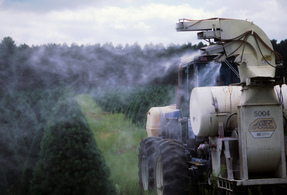 MedPage Today reported on two recent studies linking indoor home insecticide use or outdoor herbicide use to a significant increase in risk for childhood cancers like leukemia and lymphomas. Daniel S. Wechsler, MD, PhD, associate professor, pediatrics and pharmacology & cancer biology at Duke University Medical Center, noted, "The current study adds to the 'smoking gun' raised by other investigators that pesticides could contribute to the development of cancer in children...It certainly seems prudent to limit exposure of children (or anyone) to these agents, especially in indoor locations." Harvard researcher Chesheng Lu, PhD, MS, noted, "Pediatricians should remind parents with young kids to try not to use pesticides in your household and if kids go to a daycare or school that uses lots of pesticides, parents may need to talk to the school or school district to see if there's a better alternative without using chemical-based treatment." Before you start spraying your house for pests or bombarding your dandelions with herbicide, think about your children or your neighbors' children that will be exposed to the poisonous chemicals. Consider creating a healthier chemical-free yard with permaculture gardening to control your pests for you and provide a healthy place for children to play.
0 Comments
 Pesticides have been linked to health problems like diabetes Pesticides have been linked to health problems like diabetes Recent studies have confirmed an interesting link between the development of diabetes and pesticide exposure. Medpage Today reported that a review of 13 studies on type 2 diabetes found that "people exposed to pesticides such as DDT were 61% more likely to develop type 2 diabetes." Another analysis of 22 studies found "the risk of developing type 2 diabetes was still significantly higher by about 58%" in those exposed to pesticides. One of the scientists noted, "How diabetes develops is considered to be an interplay between genetic and environmental factors...Emerging evidence suggests that environmental contaminants -- including pesticides -- may play an important role in the [development] of diabetes." A separate study linked exposure to pesticides during early pregnancy to a 4.4 times increased risk of developing gestational diabetes. It shouldn't be surprising that using chemicals to poison parts of our environment can have significant effects on our health. The similarity of these chemicals to our body's hormones can potentially cause far-ranging negative effects on our health. You can start reducing your family's pesticide exposure by using the dirty dozen chart.
What are farmed fish and why are they fatter?
 Is pesticide exposure harming your family? Experts (including doctors) have long told Americans not to worry about being harmed by the chemical cocktails of pesticides, herbicides, and insecticides used to grow our produce bigger, faster, and blemish-free. However, research has now shown that Americans, including newborns, have surprising levels of pesticides accumulating in their bodies. Now that research has linked these chemical to health problems, scientists and medical organizations are finally starting to sound the alarm. American Academy of Pediatrics Recommends Reducing Pesticide Exposure The American Academy of Pediatrics released a new policy statement describing the harmful effects of pesticides and how to reduce exposure. Here are highlights of the AAP statement on pesticides:  Apples: Taste the Pesticides in Every Bite With organic fruits and vegetables now sold in almost every grocery store, is it time to take a bite? Today's fruits and vegetables are regularly doused with a variety of toxic chemicals to keep pests away. Over 50 different pesticides are found on peaches alone. More consumers are choosing organic to avoid potential risks. But when do you get what you pay for? The Environmental Working Group has performed an analysis comparing pesticide levels in common fruits & vegetables sold in America. The resulting Shopper's Guide to Pesticides "ranks pesticide contamination for 53 popular fruits and vegetables based on an analysis of 51,000 tests for pesticides on these foods, conducted from 2000 to 2009 by the U.S. Department of Agriculture and the federal Food and Drug Administration. Nearly all the studies on which the guide is based tested produce after it had been rinsed or peeled." The EWG Shopper's Guide has developed two lists to help you know when buying organic is worth the money. The Dirty Dozen includes produce covered in high concentrations of a chemical cocktail (even after rinsing and peeling). The Clean Fifteen include the cleanest produce that have the least amount of chemical residue.  No Worries Munching on These Onions _The Clean Fifteen: The Dirty Dozen:
Go Forth & Be Fruitful. What we recommendation when considering organic produce:
|
Details
THE NATURALS
AuthorsDr Aaron McMichael + Dr Ryan McMichael Categories
All
Archives
June 2025
_Information and statements made are for education purposes and are not intended to replace the advice of your treating doctor. This blog is not a doctor and will not diagnose or treat your problems.
|
 RSS Feed
RSS Feed